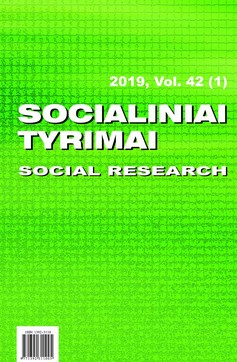Sociokratija kaip nauja organizacijų valdymo paradigma
Sociocracy as a New Paradigm of Organizational Management
Author(s): Danguolė ŠavareikienėSubject(s): Business Economy / Management, Organizational Psychology, Management and complex organizations, Human Resources in Economy
Published by: Vilniaus Universiteto Leidykla
Keywords: sociocracy; holocracy; employee involvement;
Summary/Abstract: The competitive environment encourages organizations to find ways to increase the efficiency of their activities. A new approach to A. Comte sociocracy paradigm, which was oriented towards the creation of a new type of state governance, has been transformed and adapted to the practice of improving organizational management. The article analyses the paradigm of sociocracy as a comprehensive management system that enables employees to be involved in the decision-making process to work together. To identify and formulate the nature of sociocracy as a new paradigm for management of organization, the fundamental principles were supported by theoretical research based on scientific literature sources and publications of management practices. The methods of collecting, analysing, comparing and summarising of information as well as logical generation of conclusions were used for the research. The benefit of new management paradigm for organization and its employees, confirming the effectiveness of the practical application of sociocracy was found in the course of the research. The concept of sociocracy was created by the philosopher A. Comte (Auguste Comte 1798–1857) in the context of a new model of state governance (John-Stuart Mill, 2005). On the basis of sociocrasy a new concept holocracy was created in the US, which exaggerates the “benefits” of the organization and calls to forget personal needs and to devote to a higher goal in the US (Hallas, 2013). The Dutch pacifist and educator Kees Bioke (Boeke) (Hall, 2013) has practically implemented a sociocracy management model at the Bilthoven School in the Netherlands, which has existed till nowadays. Beginning around 1970, Gerard Endenburg developed a management and governance method called Sociocracy while managing his electrical engineering corporation, Endenburg Electrotechnik, in the Netherlands. G. Endenberg developed a management system as an alternative to the classical hierarchical management system. The sociocracy decision-making method has grown in cybernetics, systemic thinking organizations that have had a tremendous impact on commercial activity in America (Mirzagitova, 2014). In Lithuania, the developers of the websites “Meetings”, “Talent Safari”, and “Primum Esse” disseminate the ideas of sociocracy and teach company leaders about the new paradigm of management that enables employees to be involved in the decision-making process. The essence of sociocracy is to allow people to delegate decisions to expert groups. As all groups of professionals have to report to the whole community, and are selected with the consent of each member, the decision-making process takes place both from the bottom to the top and from the top to the bottom. This creates feedback circles, and thus ensures good communication throughout the organization. The groups of experts act as partly independent in discussing all issues in the meetings of their members, in which each member has equal rights. The groups (referred to as small circles, called Endenberg’s rings) have frequent meetings for tactical issues. The decisions made in the group must be in line with the general organization policy. Big groups (big rings) rarely meet and deal with only very important issues. The group leader usually organizes decision-making process by taking operational decisions unilaterally. The method of sociocracy enables all members of an organization to be involved in the organization’s management process, where everyone can express their opinion.
Journal: Socialiniai tyrimai
- Issue Year: 42/2019
- Issue No: 1
- Page Range: 32-40
- Page Count: 9
- Language: Lithuanian

